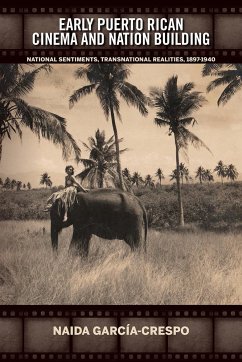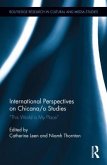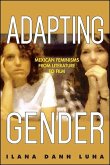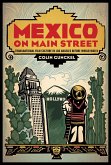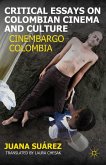Naida García-Crespo
Early Puerto Rican Cinema and Nation Building
National Sentiments, Transnational Realities, 1897-1940
Naida García-Crespo
Early Puerto Rican Cinema and Nation Building
National Sentiments, Transnational Realities, 1897-1940
- Gebundenes Buch
- Merkliste
- Auf die Merkliste
- Bewerten Bewerten
- Teilen
- Produkt teilen
- Produkterinnerung
- Produkterinnerung
Anchoring her work in archival sources in film technology, economy, and education, Naida García-Crespo argues that Puerto Rico's position as a stateless nation allows for a fresh understanding of national cinema based on perceptions of productive cultural contributions rather than on citizenship or state structures.
Andere Kunden interessierten sich auch für
![International Perspectives on Chicana/o Studies International Perspectives on Chicana/o Studies]() International Perspectives on Chicana/o Studies140,99 €
International Perspectives on Chicana/o Studies140,99 €![Indiscreet Fantasies Indiscreet Fantasies]() Indiscreet Fantasies177,99 €
Indiscreet Fantasies177,99 €![Zombie Cinema Zombie Cinema]() Ian OlneyZombie Cinema87,99 €
Ian OlneyZombie Cinema87,99 €![Adapting Gender Adapting Gender]() Ilana Dann LunaAdapting Gender112,99 €
Ilana Dann LunaAdapting Gender112,99 €![Mexico on Main Street Mexico on Main Street]() Colin GunckelMexico on Main Street180,99 €
Colin GunckelMexico on Main Street180,99 €![Consuming Reality Consuming Reality]() J. DeeryConsuming Reality37,99 €
J. DeeryConsuming Reality37,99 €![Critical Essays on Colombian Cinema and Culture Critical Essays on Colombian Cinema and Culture]() Juana SuárezCritical Essays on Colombian Cinema and Culture63,99 €
Juana SuárezCritical Essays on Colombian Cinema and Culture63,99 €-
-
-
Anchoring her work in archival sources in film technology, economy, and education, Naida García-Crespo argues that Puerto Rico's position as a stateless nation allows for a fresh understanding of national cinema based on perceptions of productive cultural contributions rather than on citizenship or state structures.
Hinweis: Dieser Artikel kann nur an eine deutsche Lieferadresse ausgeliefert werden.
Hinweis: Dieser Artikel kann nur an eine deutsche Lieferadresse ausgeliefert werden.
Produktdetails
- Produktdetails
- Verlag: Bucknell University Press
- Seitenzahl: 250
- Erscheinungstermin: 7. Juni 2019
- Englisch
- Abmessung: 231mm x 157mm x 20mm
- Gewicht: 431g
- ISBN-13: 9781684481187
- ISBN-10: 168448118X
- Artikelnr.: 54432004
- Herstellerkennzeichnung
- Libri GmbH
- Europaallee 1
- 36244 Bad Hersfeld
- gpsr@libri.de
- Verlag: Bucknell University Press
- Seitenzahl: 250
- Erscheinungstermin: 7. Juni 2019
- Englisch
- Abmessung: 231mm x 157mm x 20mm
- Gewicht: 431g
- ISBN-13: 9781684481187
- ISBN-10: 168448118X
- Artikelnr.: 54432004
- Herstellerkennzeichnung
- Libri GmbH
- Europaallee 1
- 36244 Bad Hersfeld
- gpsr@libri.de
NAIDA GARCÍA-CRESPO is an assistant professor of English at the U.S. Naval Academy in Annapolis, Maryland.
INTRODUCTION
Established Frames and Images of Puerto Rican Cinema
Conceptions of the Puerto Rican Nation…
An Alternative Approach to the Study of Puerto Rican National Cinema
This Study’s Framework
CHAPTER ONE- Contexts for a National Cinema: Cultural, Political, and
Economic Movements in Puerto Rico 1860-1952
Late Spanish Colonialism through 1898
Circumstances and Consequences of the U.S. Invasion
Initial U.S. Congressional Rule and the Formation of Puerto Rican Identity
Puerto Rican Conceptions of the Nation from 1930 Onward
CHAPTER TWO- Cinema Comes to Puerto Rico: Historical Uncertainties and
Ambiguous Identities (1897-1909)
Film Exhibition in Turn-of-the-Century Puerto Rico
Rumors of War Footage
Representing U.S. Colonial Puerto Rico
CHAPTER THREE- Stateless Nationhood, Transnationalism and the Difficulties
of Assigning Nationality: Rafael Colorado in Puerto Rican Historiography
(1912-1916)
Rafael Colorado, Film Exhibition, and the Transnational Circulation of
Cultural Subjects
Rafael Colorado as Cinematic Producer: Negotiating the Local and the Global
Citizenship in a Stateless Nation: Constructing the Puerto Rican Subject
CHAPTER FOUR- In the Company of the Elites: The Discourses and Practices of
the Tropical Film Company (1916-1917)
Inconsistencies in the Received Histories of the Tropical Film Company
The Educational/Cultural Project of the Tropical Film Company
The Tropical Film Company’s Commercial Aims
The End of the Beginning: The Tropical Film Company’s Demise and Legacy
CHAPTER FIVE- Perilous Paradise: American Assignment and Appropriation of
“Puerto Ricanness” (1917-1925)
From Big Stick to Good Neighbor: Puerto Rico as Test Site for American
Foreign Policy
Fictional Puerto Rico and Colonial Angst
Puerto Rico’s Commercial Production Model
U.S. Cinema Falls in Love with the Tropics
The MacManus/Pathé Productions
Famous Player-Lasky/Paramount Comes to the Island
Beyond Fiction: Other Aspects of the Puerto Rican Film Industry in the
1920s
CHAPTER SIX- Making the Nation Profitable: Industry-Centered Transnational
Approaches to Filmmaking (1923-1940)
The Film Enthusiast: The Career of Juan E. Viguié Cajas
Romance tropical: Re-making the Dream
The Film Impresario: The Career of Rafael Ramos Cobián
Mis dos amores: The Union of Hollywood and Latin America
Los hijos mandan: The Separation of Hollywood and Latin America
The End of an Era: The Local Government as Producer
CONCLUSION- Early Puerto Rican Cinema and Stateless Nation Building
Finding the National in the Transnational
ACKNOWLEDGEMENTS
BIBLIOGRAPHY
INDEX
Established Frames and Images of Puerto Rican Cinema
Conceptions of the Puerto Rican Nation…
An Alternative Approach to the Study of Puerto Rican National Cinema
This Study’s Framework
CHAPTER ONE- Contexts for a National Cinema: Cultural, Political, and
Economic Movements in Puerto Rico 1860-1952
Late Spanish Colonialism through 1898
Circumstances and Consequences of the U.S. Invasion
Initial U.S. Congressional Rule and the Formation of Puerto Rican Identity
Puerto Rican Conceptions of the Nation from 1930 Onward
CHAPTER TWO- Cinema Comes to Puerto Rico: Historical Uncertainties and
Ambiguous Identities (1897-1909)
Film Exhibition in Turn-of-the-Century Puerto Rico
Rumors of War Footage
Representing U.S. Colonial Puerto Rico
CHAPTER THREE- Stateless Nationhood, Transnationalism and the Difficulties
of Assigning Nationality: Rafael Colorado in Puerto Rican Historiography
(1912-1916)
Rafael Colorado, Film Exhibition, and the Transnational Circulation of
Cultural Subjects
Rafael Colorado as Cinematic Producer: Negotiating the Local and the Global
Citizenship in a Stateless Nation: Constructing the Puerto Rican Subject
CHAPTER FOUR- In the Company of the Elites: The Discourses and Practices of
the Tropical Film Company (1916-1917)
Inconsistencies in the Received Histories of the Tropical Film Company
The Educational/Cultural Project of the Tropical Film Company
The Tropical Film Company’s Commercial Aims
The End of the Beginning: The Tropical Film Company’s Demise and Legacy
CHAPTER FIVE- Perilous Paradise: American Assignment and Appropriation of
“Puerto Ricanness” (1917-1925)
From Big Stick to Good Neighbor: Puerto Rico as Test Site for American
Foreign Policy
Fictional Puerto Rico and Colonial Angst
Puerto Rico’s Commercial Production Model
U.S. Cinema Falls in Love with the Tropics
The MacManus/Pathé Productions
Famous Player-Lasky/Paramount Comes to the Island
Beyond Fiction: Other Aspects of the Puerto Rican Film Industry in the
1920s
CHAPTER SIX- Making the Nation Profitable: Industry-Centered Transnational
Approaches to Filmmaking (1923-1940)
The Film Enthusiast: The Career of Juan E. Viguié Cajas
Romance tropical: Re-making the Dream
The Film Impresario: The Career of Rafael Ramos Cobián
Mis dos amores: The Union of Hollywood and Latin America
Los hijos mandan: The Separation of Hollywood and Latin America
The End of an Era: The Local Government as Producer
CONCLUSION- Early Puerto Rican Cinema and Stateless Nation Building
Finding the National in the Transnational
ACKNOWLEDGEMENTS
BIBLIOGRAPHY
INDEX
INTRODUCTION
Established Frames and Images of Puerto Rican Cinema
Conceptions of the Puerto Rican Nation…
An Alternative Approach to the Study of Puerto Rican National Cinema
This Study’s Framework
CHAPTER ONE- Contexts for a National Cinema: Cultural, Political, and
Economic Movements in Puerto Rico 1860-1952
Late Spanish Colonialism through 1898
Circumstances and Consequences of the U.S. Invasion
Initial U.S. Congressional Rule and the Formation of Puerto Rican Identity
Puerto Rican Conceptions of the Nation from 1930 Onward
CHAPTER TWO- Cinema Comes to Puerto Rico: Historical Uncertainties and
Ambiguous Identities (1897-1909)
Film Exhibition in Turn-of-the-Century Puerto Rico
Rumors of War Footage
Representing U.S. Colonial Puerto Rico
CHAPTER THREE- Stateless Nationhood, Transnationalism and the Difficulties
of Assigning Nationality: Rafael Colorado in Puerto Rican Historiography
(1912-1916)
Rafael Colorado, Film Exhibition, and the Transnational Circulation of
Cultural Subjects
Rafael Colorado as Cinematic Producer: Negotiating the Local and the Global
Citizenship in a Stateless Nation: Constructing the Puerto Rican Subject
CHAPTER FOUR- In the Company of the Elites: The Discourses and Practices of
the Tropical Film Company (1916-1917)
Inconsistencies in the Received Histories of the Tropical Film Company
The Educational/Cultural Project of the Tropical Film Company
The Tropical Film Company’s Commercial Aims
The End of the Beginning: The Tropical Film Company’s Demise and Legacy
CHAPTER FIVE- Perilous Paradise: American Assignment and Appropriation of
“Puerto Ricanness” (1917-1925)
From Big Stick to Good Neighbor: Puerto Rico as Test Site for American
Foreign Policy
Fictional Puerto Rico and Colonial Angst
Puerto Rico’s Commercial Production Model
U.S. Cinema Falls in Love with the Tropics
The MacManus/Pathé Productions
Famous Player-Lasky/Paramount Comes to the Island
Beyond Fiction: Other Aspects of the Puerto Rican Film Industry in the
1920s
CHAPTER SIX- Making the Nation Profitable: Industry-Centered Transnational
Approaches to Filmmaking (1923-1940)
The Film Enthusiast: The Career of Juan E. Viguié Cajas
Romance tropical: Re-making the Dream
The Film Impresario: The Career of Rafael Ramos Cobián
Mis dos amores: The Union of Hollywood and Latin America
Los hijos mandan: The Separation of Hollywood and Latin America
The End of an Era: The Local Government as Producer
CONCLUSION- Early Puerto Rican Cinema and Stateless Nation Building
Finding the National in the Transnational
ACKNOWLEDGEMENTS
BIBLIOGRAPHY
INDEX
Established Frames and Images of Puerto Rican Cinema
Conceptions of the Puerto Rican Nation…
An Alternative Approach to the Study of Puerto Rican National Cinema
This Study’s Framework
CHAPTER ONE- Contexts for a National Cinema: Cultural, Political, and
Economic Movements in Puerto Rico 1860-1952
Late Spanish Colonialism through 1898
Circumstances and Consequences of the U.S. Invasion
Initial U.S. Congressional Rule and the Formation of Puerto Rican Identity
Puerto Rican Conceptions of the Nation from 1930 Onward
CHAPTER TWO- Cinema Comes to Puerto Rico: Historical Uncertainties and
Ambiguous Identities (1897-1909)
Film Exhibition in Turn-of-the-Century Puerto Rico
Rumors of War Footage
Representing U.S. Colonial Puerto Rico
CHAPTER THREE- Stateless Nationhood, Transnationalism and the Difficulties
of Assigning Nationality: Rafael Colorado in Puerto Rican Historiography
(1912-1916)
Rafael Colorado, Film Exhibition, and the Transnational Circulation of
Cultural Subjects
Rafael Colorado as Cinematic Producer: Negotiating the Local and the Global
Citizenship in a Stateless Nation: Constructing the Puerto Rican Subject
CHAPTER FOUR- In the Company of the Elites: The Discourses and Practices of
the Tropical Film Company (1916-1917)
Inconsistencies in the Received Histories of the Tropical Film Company
The Educational/Cultural Project of the Tropical Film Company
The Tropical Film Company’s Commercial Aims
The End of the Beginning: The Tropical Film Company’s Demise and Legacy
CHAPTER FIVE- Perilous Paradise: American Assignment and Appropriation of
“Puerto Ricanness” (1917-1925)
From Big Stick to Good Neighbor: Puerto Rico as Test Site for American
Foreign Policy
Fictional Puerto Rico and Colonial Angst
Puerto Rico’s Commercial Production Model
U.S. Cinema Falls in Love with the Tropics
The MacManus/Pathé Productions
Famous Player-Lasky/Paramount Comes to the Island
Beyond Fiction: Other Aspects of the Puerto Rican Film Industry in the
1920s
CHAPTER SIX- Making the Nation Profitable: Industry-Centered Transnational
Approaches to Filmmaking (1923-1940)
The Film Enthusiast: The Career of Juan E. Viguié Cajas
Romance tropical: Re-making the Dream
The Film Impresario: The Career of Rafael Ramos Cobián
Mis dos amores: The Union of Hollywood and Latin America
Los hijos mandan: The Separation of Hollywood and Latin America
The End of an Era: The Local Government as Producer
CONCLUSION- Early Puerto Rican Cinema and Stateless Nation Building
Finding the National in the Transnational
ACKNOWLEDGEMENTS
BIBLIOGRAPHY
INDEX

